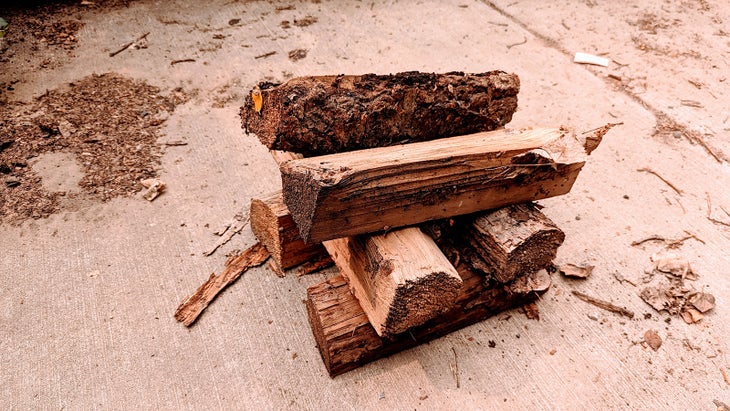 Cabin fires are easy to build and last a long time.
Cabin fires are easy to build and last a long time. Posted on 08/18/2023 9:21:47 AM PDT by SJackson
Ever wonder how to build a campfire the right way? I’ve got good news for you. Making a campfire is easy, conditions and experience willing. But you can always craft a better one than your last. Here’s some intel that’ll take your next burn a little further, even if the weather’s bad.
Any fire, no matter how you make it, needs three basic things: Fuel, oxygen, and heat. Altering the ratios of those ingredients will change the way in which a fire lights, burns, and lasts.
Take moisture content in wood, for example. Wet wood produces less heat because energy is required to bring the water contained in it to a boil. And a cooler fire produces more smoke. Water extinguishes a fire because it displaces oxygen, so wet wood will also be harder to light.
Likewise, smaller pieces of wood catch fire more easily because they heat up faster, and a higher proportion of their overall mass is on their surface, where the fuel can react with oxygen and combust. Larger pieces last longer because they heat up slower, and more of their mass is below the surface, where there’s little to no oxygen.
And, that oxygen needs to get to and around a piece of wood if it’s going to combust. So, allowing room for airflow will help a fire start and grow. Reducing airflow can help extend the time it takes for wood of a given size to burn up.
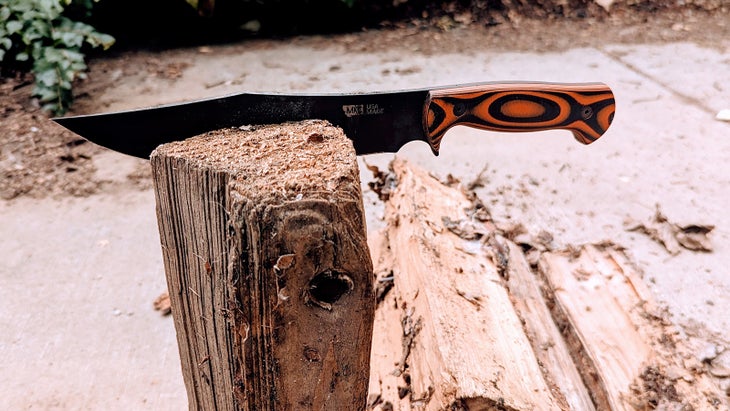 The easiest, safest way to break wood down into more manageable sizes, and to access a reliable source of dry fuel inside standing dead wood, is to use a large bushcraft knife. By placing the knife against the wood you want to split or cut, then whacking it with another piece of wood, you avoid swinging a sharp object around vulnerable body parts. I’ve really been enjoying this Montana Knife Company Marshall ($350) lately. It’s over a foot long, so it spans even large logs, but weighs only 9.2 ounces. (Photo: Wes Siler)
The easiest, safest way to break wood down into more manageable sizes, and to access a reliable source of dry fuel inside standing dead wood, is to use a large bushcraft knife. By placing the knife against the wood you want to split or cut, then whacking it with another piece of wood, you avoid swinging a sharp object around vulnerable body parts. I’ve really been enjoying this Montana Knife Company Marshall ($350) lately. It’s over a foot long, so it spans even large logs, but weighs only 9.2 ounces. (Photo: Wes Siler) If you’ve ever tried to start a fire by just holding a lighter to a log, you’ve realized that fuel sources need to start small. And if you’ve watched a pile of twigs burn to ash in a few seconds, you understand that larger, denser fuel burns longer.
Before attempting to start your fire, collect or prepare adequate amounts of tinder, kindling, and larger pieces of wood.
Tinder counts as small, fine, dry material like grasses, wood shavings, or fluffy stuff that is capable of igniting when exposed to the smallest amount of heat, like a spark or lighter flame. This quickly catches fire, but just a quickly burns up. So, you use the initial flames it produces to ignite kindling, which are small, dry pieces of wood, usually about the diameter of a pencil.
Go back to that description of why more surface area helps wood burn easier. Breaking up small twigs, or fracturing them apart with a knife can create splinters and cracks that increase surface area on kindling, helping it ignite more easily.
Kindling produces more heat then tinder, and burns longer, which you then use to ignite logs. You’ll need a few different sizes of wood to grow your fire. I like to start with some that’s about as thick as my thumb, then sticks and split logs about as thick as my wrist, and once a fire is really going, I add stuff as big around as my leg.
Gathering all this into separate piles before lighting your fire means you’ll be able to concentrate on feeding it at just the perfect moment, rather than rushing around trying to find more fuel sources as your fledgling campfire burns out.
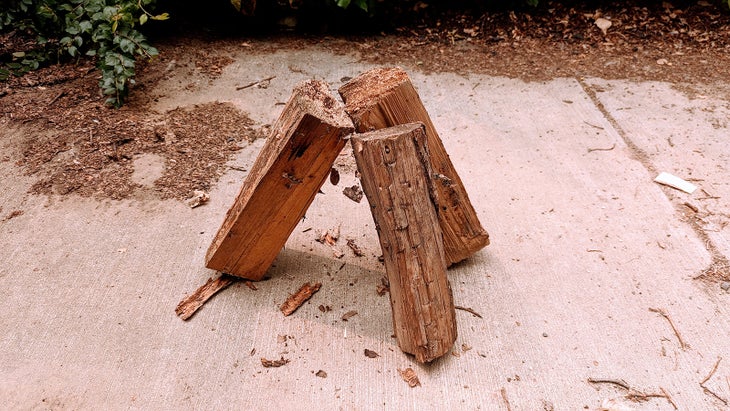 Tepee expose large portions of your logs to heat and flames from your kindling, while providing good airflow.
Tepee expose large portions of your logs to heat and flames from your kindling, while providing good airflow. Want to make a big fire that will light easily? The tepee method is almost infinitely scalable. Just prop logs up to form a loose cone, starting with kindling, then adding larger fuel as you work upward and outward. Once lit, the fire will naturally propagate through the different sizes of wood, even when your tepee inevitably collapses. Just remember to leave a door so you can insert tinder into the middle, and light it. You also want plenty of gaps so that air can flow through, but make sure your kindling is close enough to your tinder that it catches. Cabin fires are easy to build and last a long time.
Cabin fires are easy to build and last a long time.
Want a fire that will last a good amount of time, with little to no maintenance? Stacking logs in a square structure reminiscent of a log cabin will progressively burn those logs over a reasonably long period of time, and naturally facilitates airflow into the middle of the structure. Start your cabin fire by building a tepee of tinder and kindling right in the middle.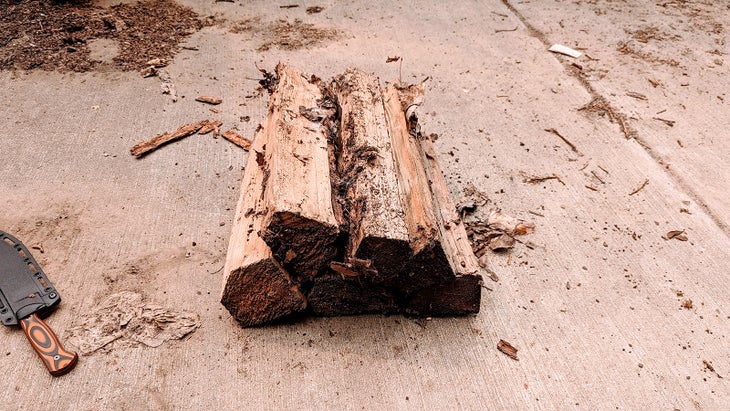 Yes, it’s just a stack of logs. The trick is to build a tepee on top large enough to create a large, hot bed of coals that then burns downwards through the logs.
Yes, it’s just a stack of logs. The trick is to build a tepee on top large enough to create a large, hot bed of coals that then burns downwards through the logs.
Want a fire that will burn all night, untended? Building a dense stack of logs, then lighting a tepee on top of it will combust the uppermost fuel, then move downwards as each layer of logs burns up. This platform or upside down fire can be challenging to master, and requires very dry logs, but get that topmost tepee big and hot enough, and you’ll have a source of heat that should burn until it’s completely out of fuel—long enough to cook a gourmet campfire meal.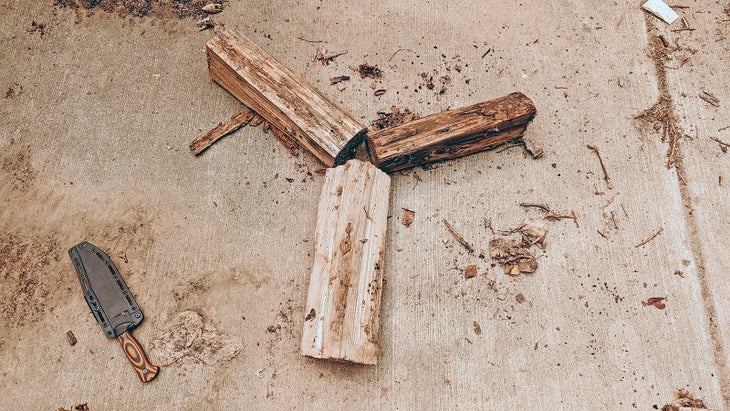 Kick back on your bedroll, open a can o’ beans, and pretend you’re a cowboy sleeping next to your star fire. (Photo: Wes Siler)
Kick back on your bedroll, open a can o’ beans, and pretend you’re a cowboy sleeping next to your star fire. (Photo: Wes Siler)
Want to achieve a long lasting fire a little easier, at the cost of regular maintenance? A classic star fire, as seen in every western movie ever made, arranges logs around a central tepee, with one end in the flames. Scooting those logs inwards as they burn allows you to control how fast, and for how long the fire burns. If you have a dished fire pit or ring, the inward motion of the logs may even be facilitated by gravity.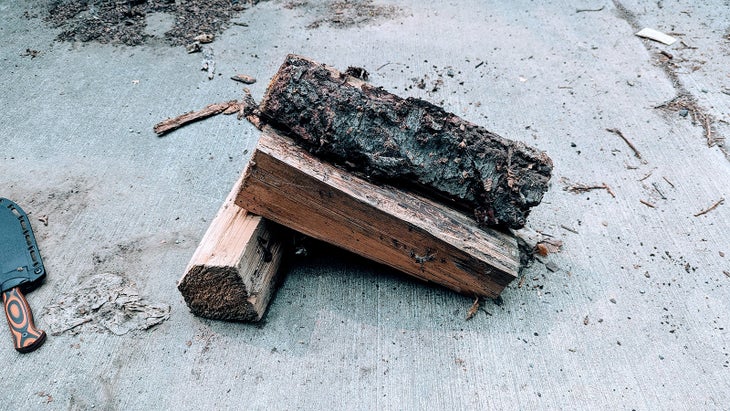 This is all I ever do. The bonus is you can use the support log/rock/whatever as a wind break. (Photo: Wes Siler)
This is all I ever do. The bonus is you can use the support log/rock/whatever as a wind break. (Photo: Wes Siler)
Once you’ve experimented enough with the techniques above and learned the nuances of campfires, you may come to the same conclusion I did: the easiest, most reliable fire style is a simple lean-to. Just prop up wood over tinder and kindling using a log, rock, or anything else you have handy. Leave some room for air, add more wood as necessary, and don’t overthink things. The principles that make the other types of fire successful—airflow and progressive fuel loading—apply here too, just in a more freeform fashion.
Consult the relevant local, state or federal management agency for where you plan to have a fire, and only build one when it’s permitted. Also consult those regulations for any required means of extinguishment. Depending on where you are, you may be required to have a shovel, water container, or bucket of sand available adjacent to that fire.
Piling soil or sand onto a fire cuts off its source of oxygen, putting it out. But, heat can be trapped below the surface, and embers can be blown into nearby fuel sources if left unattended.
Dousing a fire with water also cuts off its oxygen, and ample amounts of water can also eliminate its heat.
No matter which you use, take the time to stir the soil, sand, or water through the fire until it’s cool to the touch, and no telltale strands of smoke remain.
If a fire is crucial to your enjoyment or survival, then it’s a good idea to take more than once source of ignition. Lighters are obviously convenient, but they can run out of fuel, break, and may not work in cold or wet conditions.
Ferrocerium rods are made from a metal alloy that produces sparks when scraped. They keep working even after you drop them, last through years of use, and work even when wet or cold. But ferro rods also require perfectly prepared tinder if you’re going to be able to take advantage of those sparks. If you carry a ferro rod, you should also carry a source of tinder. My favorite are Vaseline-coated cotton balls. The petroleum jelly protects the fluffy inside from moisture, and helps extend its burn time. You can make these things at home simply by combining a handful of cotton balls with a handful of Vaseline inside a plastic bag, and kneading to combine.
You betcha. Us seniors need to pass the info, else we end up with a bunch of pajama boys. LOL.
Not interested in picking up my fingers off the ground so I use a 4-lb Roughneck Drilling Hammer to split logs on a Kindle Kracker bolted to a stubby 30-lb tree stump to make kindling for our 4,500 lb. wood burning brick oven.
No axes or hatchets or knives. To start the fire I use a Bernzomatic Campfire Starter about three feet long attached to a 16-oz propane camping canister. It’s a mini flamethrower.
Under the log pile I place three fatwood fire starter wood strips which Walmart sells in a 3 or 4 lb plastic bag. They are actual coarse cut strips of wood about 8 inches long not manufactured. From Honduras and have a wonderful aroma. They burn like crazy with no additives.
Don’t know about the various arrangements of the timber the only thing I don’t have is the fine stuff.
I get a supply of oak logs from a local seller who runs a landscape business. Am in Florida at sea level so we have issues with sometimes not having a wind current.
Still experimenting with getting the logs to burn hot and appreciate your posting, you’ve provided excellent advice on the topic.
Leaf blower
And now for something completely different....
The corrugated dryer ducts are NOT your friend. They are inexpensive, yet they trap the dryer lint. Thus a great source of fires in the home. Use galvanized metal. Smooth surface, and the screws you use to connect pieces together must not penetrate the duct, else link will build up around the screws.....just food for thought.
Fat wood, fat lighter, knot wood it’s all the same
I just use my underwear. Plenty of fuel in there to start a fire.
I prefer the boy scout fire. Just get a small fire going with a large pile of wood and then throw about a pint of gasoline on it.
POOF!
We’ve always used kerosene-soaked sawdust. With it, tent, log cabin... doesn’t matter, the sawdust burns long enough to light any stack.
Pieces of rubber tire work really well, too. Used to use them for burning brush piles in the rain and snow. Get them burning well and just start throwing brush and sticks on; once you got enough wood burning it would dry out and ignite any wood you added, no matter how wet.
Johnny and Doc are challenged by a couple of Boy Scouts to build a camp fire
Johnny cheats....
https://www.facebook.com/JohnnyCarson/videos/1973-03-30-johnny-doc-challenged-by-bsoa/10153390607340496/
On a scout outing we had been trying to get a good fire going working against the problems inherent in wet wood and wet kindling. We finally had a very small fire burning under a lay of wet wood and I just in time stopped a young kid with a gallon of white gas ready to pour/dump it on the open flame. Holy cow was that a lucky grab.
Great safety reminder Redshaw, and and like electrical cords, periodic inspection can help maintain and prevent accidents and catastrophes.
Perfect for fall firepits
A log cabin stack with a teepee built in the middle has always worked well for us. A small teepee with starter twigs and materials with a larger teepee built over it will get your fire going. The log-cabin stack surrounding it will keep the fire going for a longer period of time. You just have to have the patience to take the time to build it correctly, otherwise you are wasting your time and materials. That can be hard to do in an emergency situation.
Also, people do not realize the small items usually available to use in starting fires in an emergency. For instance, check your jacket or pants pockets or cuffs for small pieces of lint. Lint catches fire quickly and placed beneath the smaller teepee will help those twigs catch fire quicker than just using the small twigs alone.
Yes. It’s a great idea.
I make my own fire starters.
Save dryer lint
Save cardboard egg cartons
Buy candles from thrift stores
Put dryer lint in egg cartons. Melt candles and pour over lint in egg cartons. Let cool and break apart. Voila, Great fire starters. I keep some in my jeep. In my hunting gear. I use them at home to start fires in my wood stove.
Bkmk
Started out one sunny Saturday afternoon but it soon started raining when we got to where we were going.
My buddies were bummed thinking we'd have to call it a day.
I remembered we passed a little hardware store on the way to the camping area.
I told them to wait a few minutes and Id be right back.
Went and bough a small container of turpentine.
We had a nice roaring fire in no time.
Disclaimer: Opinions posted on Free Republic are those of the individual posters and do not necessarily represent the opinion of Free Republic or its management. All materials posted herein are protected by copyright law and the exemption for fair use of copyrighted works.